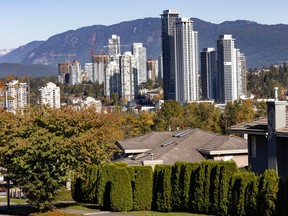How can B.C. government make moving to Alberta less enticing? Revisit the property transfer tax, says Re/Max
With high-priced B.C. experiencing a net loss of residents to interprovincial migration, Re/Max argues it warrants re-examination of policies that contribute to costs

Article content
In the past year a noticeable minority of New Westminster realtor Tim Hill’s clients have been among the British Columbians decamping from high-priced markets for less-expensive Alberta.
“In years past more people, when they were doing that transition, were going to Vancouver Island or the Okanagan,” said Hill, a realtor with Re/Max All Points. “(But) those prices have also gone up substantially.”
More than 5,000 British Columbians left the province for Alberta in the third quarter of 2023, according to Statistics Canada, which made it the fifth straight quarter that more people left for other provinces than moved to B.C., with Alberta being the net beneficiary.
Hill said his clients making the move were typically young families looking to reduce their cost of living with one family departing Maple Ridge declaring: “If we go there, we don’t have to feel like we’re in the rat race as much.”
And generally, Re/Max looked at the trend to suggest governments re-examine elements of their housing policies such as property transfer taxes to ease the burden on buyers when they can.
“The first order of business should be revisiting the first-time buyer rebate/exemption in Toronto and Vancouver,” Re/Max Canada president Christopher Alexander said in a news release.
Land-transfer taxes are a bigger issue in Toronto, where buyers face both municipal and provincial levies that add $40,000 in closing costs to an average-priced home, according to Re/Max.
In B.C., first-time buyers are exempt from property purchases up to $525,000, which isn’t a lot of help in a lot of the province — particularly Metro Vancouver — where benchmark average prices top $1 million, Alexander said.
B.C.’s property transfer tax is set at one per cent of the first $200,000 of a home’s value then two per cent of its value up to $2 million and five per cent beyond $3 million. On that basis, B.C.’s property transfer tax would add up to $21,370 on Metro’s benchmark average home price of $1.16 million.
“I think the most realistic (adjustment) would be to match it with the new-construction property transfer tax exemption,” Hill said. That threshold is $750,000 for anyone, not just first-time buyers, purchasing a newly built home.
Hill said Metro’s high prices and the lack of inventory to give potential buyers options for making a move are the biggest barriers to making purchases for his clients.
“I couldn’t recall a client that has said to me that the property transfer tax was the reason that they weren’t going to sell and buy,” Hill said.
Still, Hill said raising the threshold for the property transfer tax exemption would reduce a first-time buyer’s closing costs and potentially free up cash that could be contributed to a down payment.
Minister of Finance Katrine Conroy wasn’t available for an interview Tuesday but in an emailed statement said the province will “continue to do the work to lead the way in finding real, lasting solutions, and support those who need it the most” in B.C.’s housing crisis.
Conroy didn’t address Postmedia News’ questions on the property transfer tax, but pointed to government policies to reduce speculation in the market and increase housing supply.
In addition to Conroy’s statement, her staff, in an unattributed background note, said government “does a rigorous review of all taxes, tax credits and rebates” every year and “any changes to these measures would be announced as part of the annual budget later this month.”
Bookmark our website and support our journalism: Don’t miss the news you need to know — add VancouverSun.com and TheProvince.com to your bookmarks and sign up for our newsletters here.
You can also support our journalism by becoming a digital subscriber: For just $14 a month, you can get unlimited access to The Vancouver Sun, The Province, National Post and 13 other Canadian news sites. Support us by subscribing today: The Vancouver Sun | The Province.


Postmedia is committed to maintaining a lively but civil forum for discussion. Please keep comments relevant and respectful. Comments may take up to an hour to appear on the site. You will receive an email if there is a reply to your comment, an update to a thread you follow or if a user you follow comments. Visit our Community Guidelines for more information.